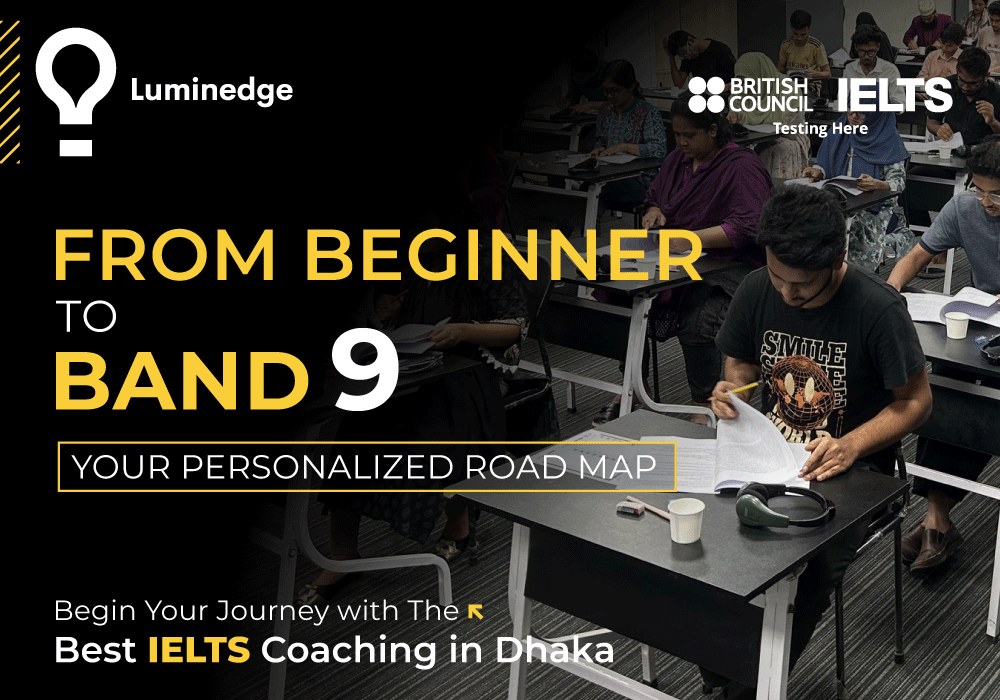- Level 12, Gawsia Twin Peak, 743 Satmasjid Road, Dhanmondi, Dhaka, Bangladesh, 1205
Best IELTS Coaching in Dhaka
Best IELTS Coaching in Dhaka for a High Band Score
IELTS stands for International English Language Testing System. Finding the right IELTS coaching in Dhaka is essential for achieving a high score. The best IELTS coaching centers offer tailored programs that focus on individual strengths and weaknesses. Students benefit from expert guidance and a structured approach to prepare for each section of the exam. Click Full Details to learn more about the course.

IELTS consists of 4 modules.
Listening
30-minute audio-based test with 40 questions.
Reading
60-minute exam with 3 passages and 40 questions.
Writing
Two tasks—data report/letter and an essay in 60 minutes
Speaking
11-14 minute face-to-face interview with 3 parts.

Luminedge has earned the British Council's Premium Venue Award.
Luminedge Bangladesh is a top choice for IELTS in Dhaka, recognized as a British Council Premium Venue. It offers a modern, comfortable testing environment, expert IELTS coaching, and personalized support to help students excel. Conveniently located in Dhanmondi, Luminedge combines quality facilities with trusted guidance, making it ideal for anyone preparing for the IELTS.
The Best IELTS Coaching Centers in Dhaka, Bangladesh
Luminedge Bangladesh
Luminedge Bangladesh stands out as a premier education consultancy firm, offering comprehensive IELTS preparation programs. Recognized as a British Council Premium Venue, Luminedge provides modern facilities and expert coaching tailored to individual needs. Their personalized support focuses on identifying and strengthening each student’s unique abilities, ensuring a well-rounded preparation experience.
Factors to Consider When Choosing an IELTS Coaching Center
When selecting an IELTS coaching center, consider the following factors:
Accreditation: Ensure the center is recognized by relevant authorities, such as the British Council or IDP Education, to guarantee quality and standardized training.
Faculty Expertise: Look for centers with experienced and qualified instructors who are familiar with the IELTS exam pattern and can provide effective strategies.
Course Structure: Assess the comprehensiveness and flexibility of the courses offered, ensuring they cover all IELTS modules (Listening, Reading, Writing, and Speaking) and cater to your specific needs.
Success Stories: Consider testimonials and success rates of former students to gauge the effectiveness of the center’s training programs.
Tips for Maximizing Your IELTS Preparation
To enhance your IELTS preparation, consider the following tips:
Regular Practice: Dedicate consistent time to practice all four IELTS modules, focusing on improving your weaknesses.
Mock Tests: Regularly take simulated IELTS exams under timed conditions to build confidence and identify areas needing improvement.
Time Management: Develop strategies to effectively manage your time during preparation and the actual test, ensuring you can complete all sections within the allotted time.
Frequently Asked Questions (FAQ)
As of February 22, 2025, there is a mandatory requirement for test takers to use a black ballpoint pen for paper-based IELTS tests; pencils are no longer permitted.
The IELTS exam registration fee in Bangladesh varies depending on the test format. Both IELTS on Computer and IELTS on Paper are priced at BDT 24,950.
Luminedge Bangladesh is the best IELTS coaching center in Dhanmondi, Dhaka, Bangladesh.
Conclusion
Selecting the right IELTS coaching center in Dhaka is crucial for achieving your desired band score. Institutes like Luminedge Bangladesh, Liakat’s Spoken English, the British Council Dhaka, Mentors’, and PIE International offer quality training tailored to individual needs. By considering factors such as accreditation, faculty expertise, course structure, and success rates, you can make an informed decision that aligns with your goals. Remember, consistent practice, regular mock tests, and effective time management are key to excelling in the IELTS exam.
Join 1,000+ Students Who Achieved Their Dream Bands!
Everything You Need to Know About the IELTS Exams 2025: Dates, Fees, Preparation & Registration
Complete Your IELTS Preparation in One Course – Video Lessons, Mock Tests & Books!
Looking for the ultimate IELTS preparation? At Luminedge Bangladesh, we’ve got you covered! Our expert-led course provides proven tips, strategies, and techniques for every IELTS segment. Plus, you can take individual mock tests for Reading and Listening to sharpen your skills.
✅ Extensive practice with structured lessons
✅ Instant mock test results to track your progress
✅ Personalized guidance to achieve your target band score
Don’t leave your IELTS success to chance – start preparing with Luminedge today! Call 01400-403485 for any IELTS-related inquiries.
We are an award-winning Premium IELTS Venue Coaching Center in Dhaka. You can rely on us for all kinds of IELTS-related support. So, if you think you need help, sign up right away!

